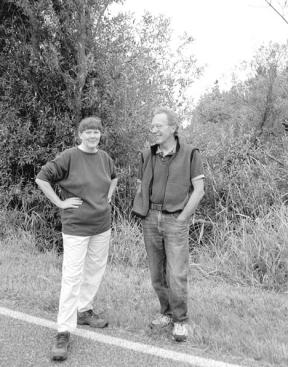Thanks to the generosity of a local family, Newman Road in Freeland is becoming a corridor of protected wetlands and preserved ecosystems.
A parcel of land — 26 acres — was donated by the family of the late William “Bill” Booth, his wife, Virginia Booth, the couple’s daughter, Linda Kast, and their grandson Bryan Kast to the Friends of Freeland. The family lives in Langley.
This parcel is the latest addition to an area that now boasts nearly 100 acres of land preserved in its natural state. This latest acquisition adjoins 13 acres of wetland the Friends own near the intersection of Newman and Scott Roads. The marshy parcel borders Double Bluff Road to Frogwell Farms and adjoins the Friends’ land on Newman Road.
Further down Newman is the 72-acre “Earth Sanctuary” owned by Chuck Pettis.
Virginia Booth said in a telephone interview this week the reason the family chose to gift the land to Friends of Freeland is because doing so will protect and preserve it in its natural state into the future.
“It will be there for people to enjoy for a long, long time,” she said. “Leaving the wetland intact will benefit the community into the future.”
The Booths purchased the land in the 1970s and according to Virginia Booth about 16 of the 26 acres of the parcel are wetland.
The gift could not come at a better time, according to Johnny Palka, a member of the Friends’ wetlands committee.
“Friends of Freeland is immensely grateful to Virginia Booth for a gift that enables us to exceed what we could not have accomplished within our limited financial means,” he said. “And it reinforces the vision that originally brought this organization together.”
He said the gift was generous in “a trying economic downturn, and demonstrates that community spirit and care for the future still flourish on South Whidbey.”
Palka said the Friends will study the property with the assistance of biologists to understand its habitat. The group plans to preserve and enhance that habitat, even has Freeland grows into the commercial center of South Whidbey.
“Everyone is keenly aware of the pressures of a growing population and increasing commercial development, particularly in the Freeland area,” Palka said. “Carefully protected natural areas provide habitat for birds, and other organisms. They also collect and purify water that replenishes the aquifer on which all of our wells depend.”
Elliott Menache, a Clinton land use consultant, said the wetlands are a critical component for the future.
“Protecting continuous wetlands is the most cost effective means of managing stormwater, improving potable water supplies and reducing the need for surface water treatment,” he said. “”It’s impossible to replicate –with man made engineering — the benefits of an intact wetland.”
Friends of Freeland formed three years ago when the western end of this wetland system, located near the intersection of Scott Road and Newman Road, came up for sale. As the successful purchaser of this 13-acre wetland, the Friends have launched clean-up projects and initiated biological surveys of the land.



